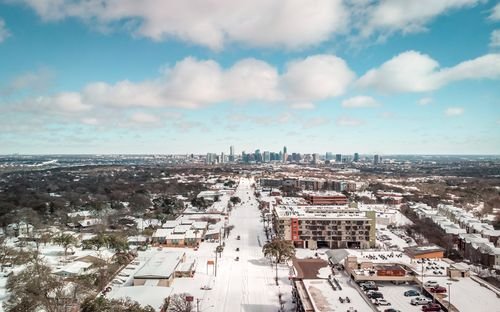Things were just getting better for restaurants in Texas. Then the winter storms hit

For Mason Ayer, the frigid winter storm that tore through Texas felt like yet another punch in the gut.
Power and water outages made it impossible to operate Kerbey Lane Cafe, the small Austin-based chain of coffee shops where he serves as CEO. All eight locations were closed for at least a couple of days. Ayer estimated that during that time, the company lost about $294,000 in sales, plus another $13,000 in spoiled inventory. And because business interruption insurance typically only kicks in as a result of physical property damage, he’s not expecting insurance to cover those lost sales.
“This storm hits, and it’s the last thing in the world our industry needed,” he said. “But it seems fitting, given everything else that’s happened over the course of the last year.”
Restaurant operators in Texas were just starting to feel like things were turning around before the storm hit on. Covid cases had started to fall, millions of Texans had received at least one dose of the vaccine and patrons were starting to come back to restaurants, which have been open for indoor dining with restrictions. For Kerbey Lane, January was the best month since the pandemic started.
But then the storm ravaged the state. Restaurants lost out on potential sales, threw out spoiled food, and because of boil water notices, had to boil the water they used to wash produce and prepare food. Some locations suffered physical damage and remain closed.
For many, it’s unclear whether insurance will cover the losses. In order to get coverage using business interruption insurance, there must be direct physical damage due to an incident that’s included in the policy terms, explained Loretta Worters, a spokesperson at Insurance Information Institute, an industry association. Power failure is excluded if the outage “originates away from the described premises,” she added.
Food spoilage coverage is an addition to commercial property insurance or a business owner’s policy, Worters said. “If a restaurant owner or any of these other businesses didn’t add that coverage to their policy, they can be out thousands and thousands of dollars,” she noted.
Valentine’s Day ruined
Jon Alexis was preparing for a busy Valentine’s Day at his two TJ’s Seafood Market locations in Dallas. “We brought in caviar, we brought in lobster, we brought in all the fancy-pants things that you impress your Valentine’s date with,” he said.
Alexis expected about $30,000 in sales across his two TJ’s restaurants. “We were really counting on that money,” he added.
Not only did he not make those sales, but he found himself throwing out about $20,000 worth of inventory, fearing that the seafood had thawed during the power outages. “I have to assume botulism and salmonella and all these other nasty things,” he said. “That’s what happens when perishable seafood enters what we in the business call the ‘temperature danger zone.'”
Alexis, who also owns a small chain of fast casual poke spots in Dallas and Austin called Malibu Poke, estimates that he lost an additional $7,500 due to food spoilage at those locations.
Fallout from the storm was another blow in an unimaginable year, said Alexis. “In the last 15 months, my restaurant group has faced a tornado that blew through Dallas … we’ve had to shut for the city closing down areas for protests and riots. We’ve had a building closed down for riot damage. We’ve had the pandemic and now we’ve had this,” he said. “And we’re just, I mean, we feel like our bingo card is almost punched.”
Alexis said he’s not planning to file insurance claims for any of the losses because he doesn’t believe they’ll be covered. He also worries that another claim, following ones he’s filed due to interruptions over the past 15 months, could make him uninsurable next year.
Monica Ruiz-Licea also had high hopes for Valentine’s Day at her two-restaurant Austin chain, Hecho en Mexico. She was particularly excited about what the holiday would mean for her second location, which has been open for just under two years and never had the chance to take off.
“We thought okay, let’s take advantage of this first big holiday after the New Year to start marketing and let people know that we’re here,” said Ruiz-Licea. Her team planned a special menu and sent out flyers. Losing that opportunity “was very devastating,” she said.
Ruiz-Licea doesn’t know what the future holds for her second location. “We’re still pretty worried that we won’t make it,” she said.
An uncertain future
Across the state, restaurants are dealing with different challenges. A pipe burst at Zavala’s Barbecue, in Grand Prairie, and the restaurant will likely be closed for months, said co-owner Christan Zavala. But even if the the BBQ joint (and coffee shop — Zavala’s operates a cafe called Mas Coffee within the building) were open, she’s not sure she would be able to get the ingredients she needs. “Food in general is pretty hard to get right now in Texas,” she said.
Khanh Nguyen, who owns Snowbite in Pharr, Texas, used to get her food through distributors. But because sales this winter have fallen so much, her orders no longer meet the minimum. Instead, her husband has been picking up ingredients at grocery stores.
Soon after the storm, grocery runs that used to take about 45 minutes began to take two to three hours. He’s had to visit multiple stores because of empty shelves or purchase limits, she said.
Nikki Senephoumy-Long has also had a hard time restocking shelves and buying ingredients for her restaurant and grocery store business Nalinh Market in Irving, Texas, after her inventory went bad. She gets her food from larger distributors, as well as grocery stores and Asian markets.
Between the lost business during the storm and lower sales during the pandemic, Senephoumy-Long doesn’t know how long she’ll be able to keep her business open. If things keep going as they are, “I probably have maybe a couple months before I have to shut my door,” she said. “And we’ve been in business for 21 years.”
Amiya Cleveland also feels uncertain about her restaurant’s future. Cleveland opened ITSO Vegan in Grand Prairie in 2019. She had adopted a vegan diet years before for health reasons, and to help members of her family learn about plant-based food options.
Just opening ITSO Vegan was a struggle. Banks were wary of the investment, which they saw as a niche operation that wouldn’t last, she said.
But she persevered, pulling her cousin into the business as a partner, and ITSO Vegan was embraced. “We opened to a mega crowd,” Cleveland said. “It was just packed.”
During the storm, ITSO Vegan didn’t lose power or water. But it had to close down for a week because it was inaccessible: The roads surrounding the location were just too icy for anyone to drive up safely. For ITSO, which saw its sales sink during the pandemic, losing a week of business and having to replenish inventory has been devastating. We’re “doing everything day by day to stay open,” said Cleveland. She’s hoping that PPP funds will come through — if they do, she’s not expecting to see that money for about a month. In the meantime, she’s set up a GoFundMe and is leaning on her community for help.
“Once we get approved for [a PPP loan], we can continue forward trying to build,” she said. “But if we don’t get community support and we don’t get this loan, we will not be able to stay open.”




